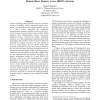Free Online Productivity Tools
i2Speak
i2Symbol
i2OCR
iTex2Img
iWeb2Print
iWeb2Shot
i2Type
iPdf2Split
iPdf2Merge
i2Bopomofo
i2Arabic
i2Style
i2Image
i2PDF
iLatex2Rtf
Sci2ools
157
click to vote
CLUSTER
2005
IEEE
2005
IEEE
Memory Management Support for Multi-Programmed Remote Direct Memory Access (RDMA) Systems
Current operating systems offer basic support for network interface controllers (NICs) supporting remote direct memory access (RDMA). Such support typically consists of a device driver responsible for configuring communication channels between the device and userlevel processes but not involved in data transfer. Unlike standard NICs, RDMA-capable devices incorporate significant memory resources for address translation purposes. In a multi-programmed operating system (OS) environment, these memory resources must be efficiently shareable by multiple processes. For such sharing to occur in a fair manner, the OS and the device must cooperate to arbitrate access to NIC memory, similar to the way CPUs and OSes cooperate to arbitrate access to translation lookaside buffers (TLBs) or physical memory. A problem with this approach is that today’s RDMA NICs are not integrated into the functions provided by OS memory management systems. As a result, RDMA NIC hardware resources are often monopol...
CLUSTER 2005 | Cluster Computing | Incorporate Significant Memory | Memory Resources | Remote Direct Memory Access |
Related Content
| Added | 24 Jun 2010 |
| Updated | 24 Jun 2010 |
| Type | Conference |
| Year | 2005 |
| Where | CLUSTER |
| Authors | Kostas Magoutis |
Comments (0)

